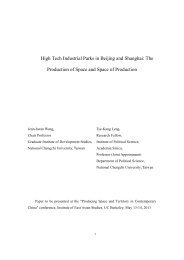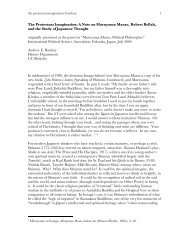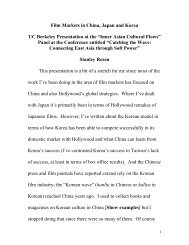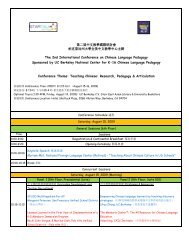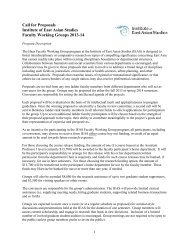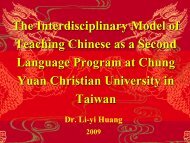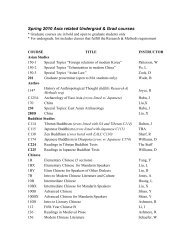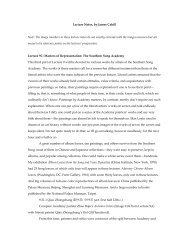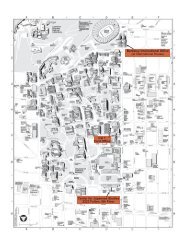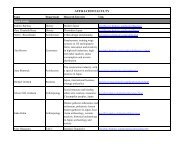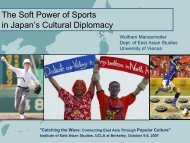Third Edition Spring 2013 - Institute of East Asian Studies, UC ...
Third Edition Spring 2013 - Institute of East Asian Studies, UC ...
Third Edition Spring 2013 - Institute of East Asian Studies, UC ...
Create successful ePaper yourself
Turn your PDF publications into a flip-book with our unique Google optimized e-Paper software.
to maintain and improve this relationship in order to satisfy theethnic Chinese, especially business tycoons who have made largeinvestments in China and play critical roles in its domestic patronagesystem. Conversely, it has to prevent Malaysian Chinese fromgetting too close to a powerful Beijing, consequently jeopardizingthe country’s own security. To do so, while taking the initiative toengage Beijing in both bilateral cooperation and multilateral dialogues,the Malaysian government has simultaneously marginalizedethnic Chinese Malaysians in intergovernmental interactions.The high volume <strong>of</strong> cultural exchanges between China andMalaysia should not be regarded as simply the combination <strong>of</strong> closegovernment-to-government engagement and increasingly developedpeople-to-people interactions. Rather, it is a very complexnetwork, in which the two governments and people with differentbackgrounds play distinct and variable roles. The ethnic Chinese inMalaysia rely heavily on the ethno-racial ties with China in orderto protect their cultural identity in their political struggles againstthe dominant Malay majority. The Malaysian government, by contrast,usually plays a contradictory role in both promoting andcurbing “Chinese culture.” Specifically, it restrains the development<strong>of</strong> Malaysian Chinese culture by prioritizing the interests <strong>of</strong> the bumiputeracommunity in most <strong>of</strong> its political agendas. At the sametime, however, it is also very active in improving bilateral ties withBeijing by promoting “Chinese culture from China” in its non-Chinesecommunities in order to encourage racial harmony among itsconstituent ethnic groups. In return, while benefiting tremendouslyfrom a momentum driven, in large part, by its close interactionwith ethnic Chinese in Malaysia, Beijing has tactically maintaineda good relationship with the Malay-controlled Malaysian governmentby acquiescing to their demand to respect the interests <strong>of</strong>the bumiputera, and by excluding ethnic Chinese Malaysians fromcertain sectors <strong>of</strong> inter-governmental cooperation.The basic pattern <strong>of</strong> Malaysia’s ethnic composition is unlikelyto change in the foreseeable future. Therefore, ethnicity willcontinue to play an important role in shaping the bilateral relationshipbetween China and Malaysia. This does not mean, however,that the current relationship is not subject to change. In fact, theUMNO-led Barisan National is facing an unprecedented challengein the upcoming election from the opposition party coalition PakatanRakyat, consisting <strong>of</strong> the self-proclaimed non-ethnic-basedPeople’s Justice Party, the Chinese-led Democratic Action Partyand the deeply conservative Pan-Malaysian Islamic Party (Malays).Regardless <strong>of</strong> the election’s final results, it is widely believed thatthe country’s domestic politics may be undergoing a major paradigmshift away from a largely ethnic-based arrangement. If thishappens, it is unclear whether the China-Malaysia relationship willcontinue to follow its current trajectory.21 Kankan Xie Ethnicity And China-Malaysia Relations 22



